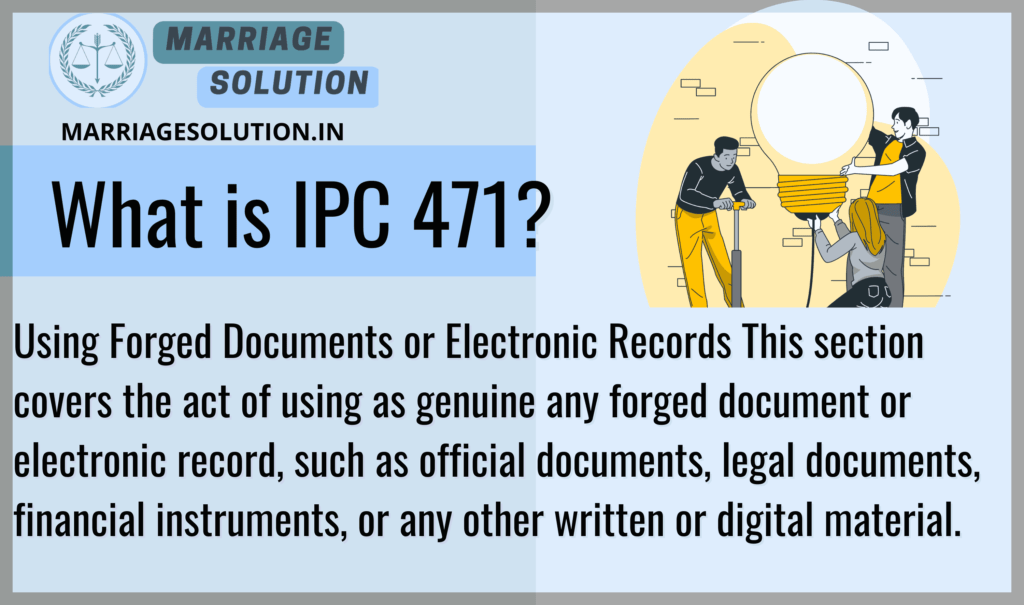Introduction of 471 IPC
The Indian Penal Code (IPC) is a detailed code that governs criminal law in India. Section 471 of the IPC deals with the use of forged documents. Forgery is a serious crime, and when someone uses a forged document as if it were genuine, it undermines trust and legal integrity. IPC 471 aims to prevent such misuse and ensure the authenticity of documents in various transactions.
What is IPC Section 471 ?
Using Forged Documents or Electronic Records This section covers the act of using as genuine any forged document or electronic record, such as official documents, legal documents, financial instruments, or any other written or digital material.

Section 471 IPC Overview
IPC 471 addresses the crime of using forged documents. If a person knowingly uses a document that they know to be forged, pretending it is genuine, they are committing an offense under this section. This applies to any kind of document, including electronic records, contracts, certificates, and identification papers.
Key Points: IPC 471 in Simple Terms
- Definition of the Offense: IPC 471 involves using a document known to be forged as if it were real. This action is fraudulent and illegal.
- Knowledge of Forgery: For an offense under IPC 471, the person must be aware that the document is forged. If the person genuinely believes the document to be genuine, they are not liable under this section.
- Types of Documents: The section covers all types of documents, including paper documents and electronic records like emails, digital contracts, and digital certificates.
- Intent to Deceive: The primary element is the intent to deceive. Using a forged document must be done with the purpose of cheating or gaining an unfair advantage.
- Legal Evidence: Documents used as evidence in court must be genuine. IPC 471 ensures strict penalties for those who try to manipulate legal proceedings using forged documents.
- Impact on Trust: Using forged documents erodes trust in official and legal documents, affecting both individuals and institutions. IPC 471 helps maintain trust and integrity.
471 IPC Punishment
Punishment: Up to 2 years, depending on the severity of the case.
Fine: The amount of the fine is determined by the court based on the specifics of the case.

471 IPC bailable or non bailable ?
IPC 471 is a bailable offense. This means that the accused has the right to be released on bail. The decision to grant bail is usually straightforward unless there are exceptional circumstances.
Section 471 IPC in short information
| Aspect | Explanation (Simple Words) |
|---|---|
| Definition | Using a fake document (paper or electronic) like it’s real, knowing it’s fake. |
| Offence | Trying to trick someone with a fake document. |
| Punishment | Same punishment as making the fake document in the first place (can be up to 3 years in jail, fine, or both). |
| Bailable | Depends on the court’s decision (can be bail or no bail). |
IPC 471 FAQs
What is IPC 471?
IPC 471 is a section of the Indian Penal Code that criminalizes the act of using as genuine a forged document or electronic record, knowing it to be forged.
Is IPC 471 Bailable or Non-Bailable?
The offense under IPC 471 is a non-cognizable and bailable offense, which means that the accused can claim bail as a matter of right, subject to certain conditions imposed by the court.
Can a person be convicted under IPC 471 if they did not know that the document or electronic record was forged?
No, the knowledge of the forgery is a crucial element of the offense under IPC 471. If the accused can prove that they were unaware of the forgery, they may have a valid defense against the charges.
If you need support with court proceedings or any other legal matters, don’t hesitate to reach out for assistance.
Court or any other marriage-related issues, our https://marriagesolution.in/lawyer-help-1/ website may prove helpful. By completing our enquiry form and submitting it online, we can provide customized guidance to navigate through the process effectively. Don’t hesitate to contact us for personalized solutions; we are here to assist you whenever necessary!
